#Cornelia Windsor
Text


An endless list of my favorite outfits worn by the Princess of Wales (81/∞):
At Windsor Castle for the final stop of the mini-tour aboard the Royal Train, on December 8th 2020, wearing:
Catherine Walker coat
Troy London ‘Faux Fur Lapel Collar’ in ‘forest green’
Alexander McQueen clutch
Cornelia James ‘Alice’ merino wool pair
Amaia Kids ‘Katie and Millie’ print mask by Amaia Kids
Queen Elizabeth II’s Diamond Frame Earrings
#favorite pow outfits#catherine#princess of wales#catherine walker#troy london#alexander mcqueen#cornelia james#amaia kids
10 notes
·
View notes
Text


✧。 –– ( madelaine petsch , she/her , cis woman ) who is 𝗟𝗢𝗟𝗔 𝗪𝗜𝗡𝗗𝗦𝗢𝗥 anyways? ew. you don’t know about her , we’ll bet you want to. they’re feeling 𝗧𝗪𝗘𝗡𝗧𝗬-𝗡𝗜𝗡𝗘 and 𝗢𝗡𝗟𝗜𝗡𝗘 𝗦𝗛𝗢𝗣𝗣𝗜𝗡𝗚 feels like a perfect night to them. rumor has it they’re 𝗩𝗘𝗡𝗢𝗠𝗢𝗨𝗦 and 𝗖𝗬𝗡𝗜𝗖𝗔𝗟 because they care , but they’re also 𝗣𝗥𝗔𝗚𝗠𝗔𝗧𝗜𝗖 and 𝗔𝗟𝗟𝗨𝗥𝗜𝗡𝗚 in the best way. she works to make a little money as a 𝗙𝗥𝗘𝗘𝗟𝗔𝗡𝗖𝗘 𝗠𝗢𝗗𝗘𝗟 / 𝗣𝗜𝗔𝗡𝗢 𝗜𝗡𝗦𝗧𝗥𝗨𝗖𝗧𝗢𝗥. they’ve rented a place on cornelia street in the form of 𝗞𝗔𝗟𝗘𝗜𝗗𝗢𝗦𝗖𝗢𝗣𝗘 𝗟𝗨𝗫𝗨𝗥𝗬 𝗔𝗣𝗔𝗥𝗧𝗠𝗘𝗡𝗧𝗦. 𝗖𝗔𝗥𝗗𝗜𝗚𝗔𝗡 (𝗕) is the song they could dance to the beat of forevermore.
⠀ ⠀ ⠀ ⠀⠀ ✧。⠀𝐓𝐇𝐄⠀𝐁𝐀𝐒𝐈𝐂𝐒.
full name : lola skye windsor.
nicknames : lo.
dob : january 29 , 1995.
age : twenty nine.
zodiac : aquarius.
parents : millicent windsor ( nee lewis ) & charles windsor.
occupation : freelance model / piano instructor.
gender : cis female.
pronouns : she / her.
orientation : bisexual.
piercings : ears , has lost count of exactly how many. nose , removed. smiley , first piercing she got when she turned 18 and long since removed.
tattoos : coming soon.
⠀ ⠀ ⠀ ⠀⠀ ✧。⠀𝐓𝐇𝐄⠀𝐁𝐈𝐎𝐆𝐑𝐀𝐏𝐇𝐘.

lola was born into what most would describe as small town royalty. sure , the town was quiet and quaint. but her father’s great great great great ( you get the picture ) grandparents had practically built it. old money holds more weight than new. and the town remained indebted to the windsors.
her , being the only born heir to their fortune , was raised and expected to carry herself in a very specific way. there was a lot resting on her shoulders. the people looked to her for guidance. and her peers would often be seen trying to mimic her behaviors or fashion choices. at least , that was the story her mom already tried to spin.
truthfully , her peers did not give two craps about her. in fact .. most of them were tired of her pretentious attitude. and were unfair to cut her down to size any time an opportunity arose. she learned to throw a fairly lethal punch by the time she was seven.
unable to explain the trouble and disconnect with her peers to her parents , and still the lonely outcast among children who had no use for her family’s riches , lola spent most of her childhood alone. tucked somewhere between books , shopping with her mother anytime a single tear was shed , and glued to her piano.
by the time of her sweet sixteen , she had decided she was done with their small town. in place of a party … lola sat her parents down to explain her life plan. how the second she graduate , she would head off to the big apple to make something of herself. on her own accord. she didn’t want them funneling her money and instead , for the next two years wanted to get a job to begin her savings. they were mortified , but agreed all the same. if only to remain on her good side when it all blew up in her face.
to their dismay , it didn’t. lola worked three after school jobs to build her savings. picking up anything open in their small town. she happily worked for anyone who would hire her , regardless of their reputation. and the day after graduation , as promised , she was off to new york.
everything after has felt like a fever dream. the shitty apartments , the terrible jobs , night classes to give herself a back up career , landing her first few modeling jobs and building a half way decent portfolio , falling in love and getting her heart broken. but she wouldn’t change it for the world.
⠀ ⠀ ⠀ ⠀⠀ ✧。⠀𝐐𝐔𝐈𝐂𝐊 ⠀𝐅𝐀𝐂𝐓𝐒.
after the break up , lola did have to go crawling back to her parents. she thought about returning home. settling down in the life they always imagined for her. but it was her father who convinced her to stay. he paid for her new apartment , in full for a year. if she still felt that way at the end of the lease … he’d head up to new york to pick her up himself.
modeling hadn’t always been the dream. when she originally laid out her big city dreams , it had been to make it in the new york city ballet. but … skipping all those practices in favor of piano definitely caught up to her.
she has not been back home in over ten years. her parents come to her for all major holidays. part of her is definitely worried if she goes back , she’ll get stuck there.
a caffeine addict , lola is always visiting a new cafe throughout the city. she may or may not have an instagram page dedicated to reviewing them , but there’s no name attached to it so you can’t prove anything.
more to come soon.
3 notes
·
View notes
Text

WINDSOR WINNIE HOLLINGS
name: windsor hollings
nicknames: winnie, winds, windy, win.
date of birth: may 26th
zodiac: gemini sun, aries moon, aries rising
age: 30
residence: studio apartment
fc: kelsea ballerini
skeleton: muse b - seven
Windsor was born and raised in a small town by a single dad who worked his arms off to give her the world, and that's how she was raised, to work very hard for what she wanted. She was kind to anyone and everyone she met, constantly bringing stray animals home, making new friends at recess and convincing everyone that kindness was the way forward.
From a very young age, Winnie loved to sing. Her dad did work on the local vocal teacher's house so she'd give Winnie lessons for free, and then did the same with the town's guitar teacher, and just like that, by the time she was 12, Winnie was singing in every chapel, performing on every stage they'd let her be at, and loving every second of it. She was destined for great things, not for this small town, and she knew it.
Her big break came at 18, when a scouter heard her play at a local bar, and offered her a recording deal. Things blew right up from there, and Winnie picked up her roots, her dad and her guitar and moved to Nashville. She'd lived there, performing all over the country, living the superstar life, with her dad as her manager and her best friend in the world.
Only now, when she tried to change her style a little, reinvent herself at thirty, did Windsor decide to change labels. Her dad had thrown down roots in Nashville, and didn't wanna move with her until she was properly settled, so she moved into a studio apartment on Cornelia Street with her labradoodle Felix.
#cornelia.intro#bio.winnie#this is very bare but i wanted to post it anyway and i'll just edit more of it tomorrow
3 notes
·
View notes
Text
William Henry Packard and the Civil War [Part 1]
In a previous post, taking from my family history, I wrote about Barnabas and Ruth’s son, William Henry (called William H. in the rest of this article), whom was born on October 1, 1822, in Plainfield, and became a farmer who settled in Windsor, living there at least from 1850 to 1860 marrying Rachel Bartlett Tillson on May 20, 1847. I also noted that William H. and Rachel had at least four children, being Welcome, Cyrus W., Frank, Alice Cornelia, Joseph A., Fred, Mary, and William Luther, adding that in 1860, William H. was a farmer who owned a farm which was worth, fully, over $2,000. I then wrote about William H.'s participation in the Civil War:
In 1862, the family of William H. and Rachel would be drawn into the Civil War...William’s brother, Roswell, a unmarried Massachusetts farmer, fought, enlisting on September 2, 1862. Unlike William H., he enlisted in Company F of the Massachusetts 46th Infantry Regiment, became a corporal on June 9, 1863, and was mustered out on July 29 in Hampden Park, Springfield, Massachusetts...On November 3, 1862, he [William] enlisted in the Union Army at Camp Brigg in Pittsfield...He would serve as a private within Company I of the 49th Regiment of Massachusetts Volunteer Militia. As part of that unit, he would see action in Baton Rouge, Louisiana, and he would be discharged honorably on September 1, 1863 after 10 months of service when his unit disbanded at Pittsfield...
He served for 9-10 months in the 49th Regiment commanded first by Captain William Francis Bartlett. The unit, after moving from area to area, gained a “reputation for good discipline.” It left from Long Island to Louisiana on the Illinois steamer in January 1863, arriving in New Orleans by early February....The unit was attached to 1st Brigade, 1st Division, of the 19th Army Corp. It engaged in reconnaissance on Port Hudson in March, and then fought in the siege of the same area in May through July, off and on...it [also] fought at Plain's Store and at Cox's Plantation (“line of Bayou Lafourche”) during the summer...In fighting at Port Hudson, it was assisting Farragut’s union fleet. During its time in service, 2 officers were killed, 28 men killed or mortally wounded, and 84 men killed by disease...
By August 9, after staying in the nearby area, it left New Orleans, going on the Templer steamer to Cairo, Illinois, and taking a train to Pittsfield, where it arrived on August 22. Once there, there was likely an “enthusiastic reception” (with Rachel and family likely in attendance) and it was “mustered out of the United States service” on September 1. The battles the unit was engaged in were sometimes Union victories. This was the case in the siege of Port Hudson from May to July 1863, allowing the Mississippi River to be open to “Union navigation from its source to New Orleans” and the fight at Plains Store, which closed the last “Confederate escape route from Port Hudson,” with Confederates dragging away some of “their cannons by hand rather than abandon them to the Yankees.”...However there were some Confederate victories...One such victory was at Cox’s Plantation...In a broader context, the siege of Port Hudson was part of the offensive up the Mississippi River. Furthermore, with the fall of Vicksburg, and surrender of Port Hudson later that month, the Union was going “unvexed to the sea” as Lincoln put it...Simply put, the surrender [of Port Hudson] gave the Union “control over the entire Mississippi River, cutting off important states such as Arkansas and Texas” as the National Archives notes. The siege, the longest in U.S. history, was a massive operation, with 30,000 Union troops under the command of General Nathaniel Banks surrounding the Mississippi town and Confederate stronghold...
600 Black soldiers died in the fierce battle, fighting [against] the Confederates. This victory was one of the most significant days of the war, and 41-year-old William H. was part of the reason [they were victorious], along with his valiant unit. The battle changed the tide of war to favor the Union, which would emerge victorious after a little less than two more bloody years. For this, descendants of the Packard family should be undeniably proud, especially since other descendants fought for the Union...William had eagerly answered the call to serve as a private, going from the “free” north to fight in the slaveowning South, even passing through enemy territory on the steamer to New Orleans, after the Union was advancing more into the South...He possibly enlisted not only out of feelings of patriotism but to prove his “manliness"...William H., one of the 17 individuals who enlisted in Windsor, with pay of only $13 a month, had a number of fellow soldiers that he got to know very well.
In my family history I added that two years after he returned, William H. was a farmer and legal voter, living with his wife Rachel and eight children. Matthew Stowell asks below if I received his military record from the National Archives and the answer is currently no, but is another avenue to pursue.
I mention this because of an article I read by Tim St. Onge about the Peninsula Campaign, which was a "failed attempt to capture Richmond, Virginia, the Confederate capital, by landing troops at Fortress Monroe in March 1862 and attacking northwest up the peninsula formed by the James and York Rivers."
Looking into this more, I found that Samuel Sumner, Lt. Colonel of the 49th Regiment, held a reunion of those former volunteers of the 49th Regiment of Massachusetts Volunteer Militia like William H. Sumner read a poem about their shared war experience. Rodney M. Torrey, writing from Camp Banks, Jamaica, N. Y., on January 4, 1863, said that William H. missed home, calling him "Henry Packard":
I received yours and father's letter this evening, and was glad to hear that you are all well. I am well, (except a slight cold now), and have been since you were at Worcester. Father wanted me to write about those he was acquainted with. Henry Packard is not very tough. I think he is homesick.
If this is accurate, it means that Bob Mills's speculation in The Packard/Mills Family History, that William H. "might have enlisted to escape the children or the farm" since he was forty years of age, may be inaccurate. Perhaps he entered the military service for other reasons!
Note: This was originally posted on November 18, 2018 on the main Packed with Packards WordPress blog (it can also be found on the Wayback Machine here). My research is still ongoing, so some conclusions in this piece may change in the future.
© 2018-2022 Burkely Hermann. All rights reserved.
#civil war#slavery#slaveowners#black history matters#black lives matter#packards#genealogy#family history#genealogy research#lineage
0 notes
Text
Episode 12: Invasion of Imperial Territory

August 796/487. Yang, Sitolet, and Cazellnu get stuck in traffic. They run into Lebello and give him a lift in their handy military zip-helicopter. At the High Council meeting, Royal Sanford and Cornelia Windsor convince all council members except for Lebello, Huang, and Trunicht to vote in favor of the military’s proposed invasion of Imperial territory. With the operation approved by the government, Sitolet convenes a meeting at which he appoints Lobos to command the mission of eight fleets totaling 30,227,400 soldiers, with Greenhill his second in command. Andrew Fork, who crafted the invasion plan, accuses Yang of aiding the enemy. Meanwhile Rubinsky and von Remscheid go on a....date? No, okay, they’re probably just talking politics. Probably.
...Okay, got all that? We’ve been focused on laying the groundwork of the main themes and relationships that we’ll be following throughout the series, which means that many of the little plot details and secondary characters that have flitted by so far haven’t figured heavily in our posts. Since this episode is less like an iceberg and more like an ice floe that’s mostly above the water, I’m gonna take this opportunity to formally introduce us to some of these (many, many, many) characters.
Alex Cazellnu

Pictured here with his characteristic “I’m not quite sure what’s happening around me” expression, Cazellnu is Yang’s friend and former upperclassman from the military academy. Many mysteries surround this man, as we’ll talk much more about later. For example, how did he land such a smoking hot and kickass wife? (We’ll see her soon, don’t worry.) What made him think Yang was fit to be anyone’s legal guardian? (Yes, that was his brilliant idea.) And what the fuck kind of name is Cazellnu? (Actually my guess is that it’s based on the word caserne meaning military barracks, which is a bit on the nose honestly since his job has to do with supplies and housing…)
More seriously, Cazellnu plays an interesting and important role in the show: He personifies the heteronormative societal structures and assumptions both of the in-universe world and the world of the audience. Like so much in LoGH this has a dual purpose. For the characters around him, the normative crap he says applies concrete pressure on them to meet the expectations of their society. For the audience, he explicitly articulates some of the (incorrect) "surface readings" that help the show pass as way straighter than it is. We will of course be keeping an eye out for these moments as we get to know him better.
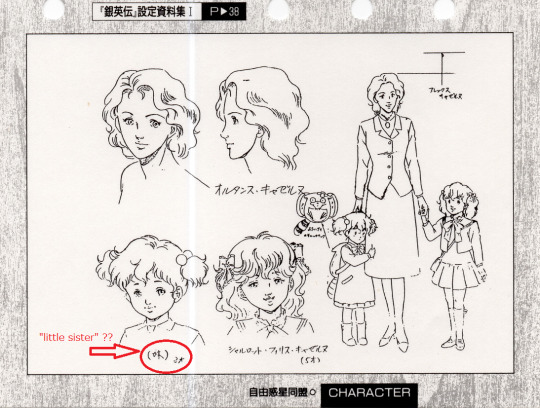
Another Cazellnu mystery: Why didn’t he bother to give his younger daughter a name? Did he use up all the female names he could think of on Charlotte Phyllis??
Sidney Sitolet

We’ve seen Fleet Admiral Sitolet (or Sithole, as it’s sometimes spelled, but come on, have some respect…) before, most recently when he was laying a major guilt trip on Yang about trying to resign from the military. In this episode he intensifies that guilt trip even further, telling Yang that he’s the literal only hope for preventing the whole military from falling into the hands of over-ambitious zealots eager to get everyone gloriously killed. Sheesh. I know that Sitolet is clearly demarcated as one of the Good Guys here—an older, more powerful, slightly sterner version of Yang who is also extremely practical about using his resources to try to minimize the damage caused by the continuing war. And Yang is one of those resources. I get it, but...this scene at the end of this episode just makes me want to write AU fanfic where Yang tells him to go to hell and moves to a nice mountain villa where he writes history books all day while Julian goes shopping at the local market for the best deals on high quality tea.

...What, a girl can dream, can’t she?
(From episode 3.)
Anyway, platitudes about patriotism and duty to crush the Evil Empire etc. won’t keep Yang in the military, but Sitolet is the one who knows exactly the kind of logic Yang finds inescapable. As much as it obviously frustrates and saddens him, Yang feels the burden of Sitolet’s expectations.
João Lebello

Or Joanne, sure, why not.
This is the first time we’re seeing Lebello, the current secretary of the treasury serving on the Alliance High Council. He’s a childhood friend of Sitolet’s, and their banter reminds me a bit of Yang and Cazellnu’s friendship.

In the council’s deliberations, he’s the loudest voice speaking up against the invasion, on the grounds that their economy is already being stretched thin by the ongoing warfare and further military spending could lead to collapse. Unfortunately the counter of “eh we’ll just print more money” is persuasive to most of the council, who vote in favor of the invasion in hopes that a victory will improve their polling numbers. Let’s hear it for democracy!
Huang Louis

Like Yang, his family name is first; his given name is ルイ in Japanese, and I’ve seen it rendered as Rui, Lewi, or Louis.
The only other council member to speak against the invasion plan. Huang is quietly awesome; I don’t have a ton to say about him yet other than that, and the fact that I totally ship him and Lebello.

Huang/Lebello is pretty high up there on the LoGH Ships expanding brain meme.

Cornelia Windsor

The token woman on the council, Windsor does a great job smashing the sexist stereotype that women are less likely than men to warmonger and advocate the deaths of millions of citizens. And she does so while reminding me so strongly of Dolores Umbridge that I’ve been trying to convince myself that J.K. Rowling must have watched at least the first twelve episodes of this show somehow.

I mean, just look at that giggle.
There are three philosophies put forward in the council discussion: Lebello and Huang making practical arguments about the toll the war is taking on the Alliance economically and socially; Sanford, the head of the council, arguing that inaction is less likely to get them re-elected than a potential victory; and Windsor making the ideological case that war against the Empire is so righteous that no cost is too great to pay.
I’ll go out on a limb and say this show hasn’t been very subtle from the beginning about its distaste for people making arguments in favor of war and destruction on purely ideological or dogma-driven grounds. This stance seems mostly uncomplicated for now—pragmatism: good; blind idealism: bad—but so far the stars have aligned so that the characters spewing the dogmatic rhetoric are using it to push for increased death. It’s easy to roll our eyes at ideals of honor and glory in war; what about ideals like “try not to kill people if you don’t have to”? What if those go against the pragmatic arguments? We’ve already seen this tension a bit between Yang and Jessica, with his willingness to work within the military clashing with her ideals of pacifism, even though their ultimate goals align. In those cases there’s much less of a clear cut answer.
...But for now at least, we can all agree this Umbridge-wannabe person sucks.
Job Trunicht

(From episode 6.)
We’ve already heard plenty about Trunicht and we’ll hear plenty more, so I won’t dwell on him here. But a quick Fun Fact*: Yang, being generally a luddite, refused to even get a remote control for his TV (er sorry, SolidVision) for a long time, until Trunicht started appearing regularly on the news. Yang hated seeing Trunicht’s face for even a split second so much that he would bound up off the couch to turn it off as soon as Trunicht showed up. Of course Yang is incredibly lazy, and he finally realized that with a remote control he could remain on the couch and have to see Trunicht’s face for even less time, so he caved and bought one; and now he sits eagerly watching the news with the remote clutched in one hand, hoping he’ll have the chance to turn it off in disgust.
...Relatable.
*Source: Julian’s Iserlohn Diary, one of the side stories written by Tanaka. Yes yes our canon here is the anime not the books; but we get to pick and choose adorable details that we like, and I hereby make this one Official Icebergs Canon.
Andrew Fork

Speaking of characters spewing pompous platitudes about war, meet Andrew Fork, who I really really wish I could say was a hyperbolic caricature who could never exist or gain actual power in real life but………..*looks around* here we are I guess. Fork must be a historian who wrote his thesis on early 21st century Earth internet message boards, since he employs tactics like accusing anyone who questions the practical implementation of his ideas of Aiding the Other Side. I again can’t resist sharing a passage from the novel of another character describing Fork:
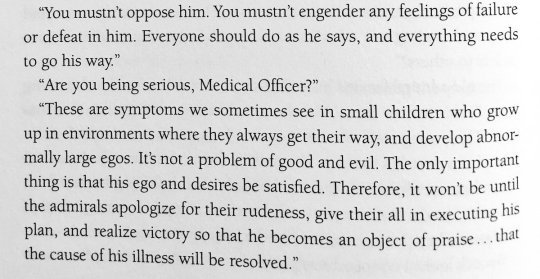
*thinking emoji*
*thinking emoji*
*thinking emoji*
I dunno it sounds familiar but I can’t place it...
Alexander Bucock

As you can tell by him giving Fork shit, Bucock is one of the more level-headed of the admirals. We’ll get to know him better in the future, so for now I’ll just mention that he’s awesome and him telling Fork that he’s impolite makes me happy. And that you shouldn’t get him mixed up with Lobos just because they both have white/gray hair and a mustache, as I may have done through pretty much the whole first season...
Quick Aside: Names
Cazellnu/Caserne/Caselnes? João/Joanne Rebelo/Lebello? Sitolet/Sithole/Shithole? Rui/Lewi/Louis? Fork/Falk? Bucock/Bewcock? Mittermeyer/Mittermeier, Reuental/Reuenthal, Mintz/Minci, Lap/Lapp/Shithole…??? It might have come to your attention by now that there is complete consensus about the spelling of essentially zero LoGH names.

You’d think “Jessica Edwards” would at least be free from controversy, but…..
(From episode 2.)
Given that there doesn’t seem to be one clearly “official” source, and that it’s 1600 years in the future, we’re not especially hung up on trying to be super authentic and picky with our spellings. Maybe Cazellnu’s distant ancestors who also managed military barracks were named Caserne, but the spelling got modified as humanity emigrated to the stars; it happens. Generally our policy is to spell things however we happen to feel like it, based on some combination of aesthetics and just what we’re used to, and to be as consistent as we can once we pick a spelling; but we’re not really in the business of trying to arbitrate which spellings are “correct.” There’s too much about LoGH that’s worth caring passionately about to spend that much energy on the names.

...Except Minci is still wrong, sorry animation notes that came with the laserdiscs.
Okay now, where were we…
Lazzll Lobos

...What, really? Lazzll, that’s what the subbers went with? Is that even a name? *quick Google search* No, no it’s not. Well, apparently it’s more commonly spelled Lassalle, but y’know what, I’m sticking with Lazzll god dammit. I make the rules here.
I don’t have anything to say about him beyond his name and that he is different from Bucock apparently.
And last but not...well okay maybe also least?
Adrian Rubinsky

When we last mentioned Rubinsky he was musing about how to use Reinhard and Kircheis’s relationship to his advantage somehow; here we find him informing the Imperial High Commissioner to Phezzan about the Alliance’s impending invasion, which he learned about...somehow. His air is constantly that of one attempting to play puppet-master and sculpt the situation to his own advantage, although ostensibly he is only doing his duty here as an Imperial subject, Phezzan being officially a territory of the Empire. It’s on his information that the Imperial nobles set Reinhard’s fleet in motion to meet the Alliance invasion force, as Yang was afraid they would do.

We also very very briefly meet Dominique Saint-Pierré, a mistress of Rubinsky's, seen here pouring wine while both men leer at her; she has more power than this glimpse suggests, though, and the power struggles between her and Rubinsky are definitely the most interesting aspect of Rubinsky’s role in the story.
Phew! And with this we conclude the entry that will probably mention the highest number of canonically straight characters by name of any Icebergs post. I hope you got all that; yes this will be on the exam.
Stray Tidbits

I love the four-hour traffic jam caused by some intern feeding a corrupt string into a computer. I’ve mentioned how realistic the self-driving car system on Heinessen feels, and having it break down only adds to the realism.
So much for Yang’s optimism that capturing Iserlohn would lead to peace negotiations rather than an escalation of the war. Cracks are starting to show in Yang’s admiration of this whole “let the people control the government” thing, and I don’t blame him; especially since the Alliance “democracy” seems to involve decisions made by simple majority vote by an eleven-person High Council?? Umm?

The subs tried to make sense of this line by drawing a distinction that I don't think is there in the Japanese: Yang uses the same verb, "akusei o shite iru," for both governments, where akusei (悪政) is literally bad+government. My interpretation is that Yang is expressing frustration at the irony of people choosing to elect a government that nevertheless governs against their interest...but I guess I might be projecting.
I love this random shot of a Phezzani street. Most Obscure LoGH Love Triangle Award goes to the three teenagers on the right; I wonder which of them is the vertex?? This is the fanfiction the world demands.

#Legend of Galactic Heroes#Legend of the Galactic Heroes#author: Rebecca#Alliance#Cazellnu#Hortence#Sitolet#Shithole#Lebello#Huang#Cornelia Windsor#Umbridge#Trunicht#Andrew Fork#Bucock#Lazzll#Rubinsky#Dominique#names#okay it's Mittermeyer not Mittermeier though#also Reuental#Elizabeth yelled at me for not clarifying those in the post oops#Huang/Lebello4eva
14 notes
·
View notes
Text
opening lines meme
Rules: List the first lines of your last 20 stories. (If you have less than 20, just list them all!) See if there are any patterns. Choose your favourite opening line. Tag some people to play the next round!
Not tagged by anyone, but I saw this and thought it would be a fun jaunt through my fics. 20! That’s multiple fandoms and probably close to a decade
Three things happen in the autumn of 1929.
They have been in Buenos Aires for three days finalising the preparations for their Antarctic expedition when Cornelia announces at breakfast that she will be departing on the ferry bound for Montevideo within the hour, and will stay overnight.
Citra Terranova had been apprenticing under Marie for two months when she asked the question.
Scythe Marie Curie never expected to feel anything ever again, but here she is.
It's not what you think, he told Camille, but now he's not so sure.
As the plane disappears from view, Sebastian breathes his last.
Warm skin, a heartbeat, fingers toying with her hair: the luxurious decadence of lying naked with a man she’s just made love to.
Sunlight; an impression of morning.
As they ride the elevator up to his room, they don’t speak.
In her dreams, Cornelia’s feet are bare.
The air is cool and fresh; sunrise is just breaking over the blue horizon.
[This is a transcript from the spoken log book of Cornelia Cavendish. Entry not for publication.]
“It’s shallow,” Dorothy says, as she places a final piece of tape over the dressing she applied after removing the buckshot from Cornelia’s abdomen, “but I would strongly recommend that you abstain from drinking for the next few days.”
Gill collapsed, breathless and boneless, against the covers, head falling so heavily against the pillow that she sank into it down to her ears.
They name her Catastrophe on her second day of training.
After Janet's speech, Gill's retirement party really gets started.
You've always liked tall women, and Julie Dodson certainly is that.
Julie Dodson, five-time winner of the Royal Windsor Horse Show's showjumping ribbon, was nursing her wounded pride in the A&E waiting room at Oldham General Hospital.
Sammy Murray did not make his way into the world easily.
Gill sighs and tugs the changing room curtain open.
Patterns? I suppose the biggest thing I notice is a tendency to use my first line to introduce setting - either where or when or both - rather than character, for the most part. Though obviously the best ones do a little bit of both.
Favourite? Hard to choose, but I am pleased with “‘It’s shallow’...” because that drops you right into exactly when this is happening, is exactly the kind of thing Dororthy would say, and something the audience knows immediately that Cornelia will ignore. I also quite like the showjumping champion one, because it introduces the AU scenario pretty neatly.
I was right, this was almost a decade! Number 20 was posted in 2014 :). That’s five fandoms there, too, which is a lot for me.
I tag @tayryn, @troiings, @eunyisadoran
7 notes
·
View notes
Photo
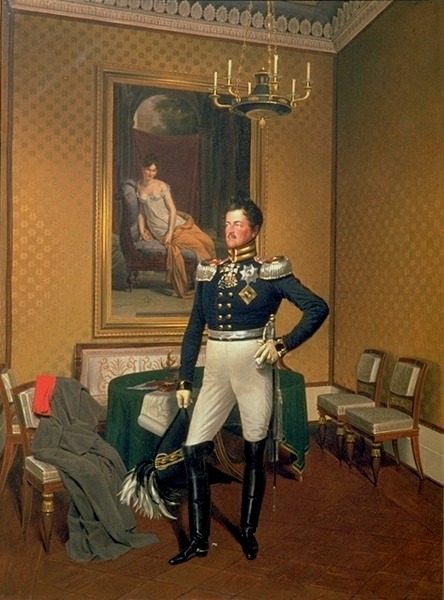
Charlotte’s Heart Is Broken Perhaps it was, after all, a good thing that she was going back to Cranbourne Lodge. The season was over at Weymouth and the place had lost its summer charm.
#charlotte courtenay countess of rosslyn#cranbourne lodge#edward duke of kent#emily theophila flower viscountess ashbrook#frederica charlotte of prussia duchess of york and albany#juliette récamier#miss cornelia knight#miss rumbold#prince augustus of prussia#prince leopold of saxe-coburg-gotha (later king of the belgians)#princess charlotte of wales#prinny&039;s daughter: a biography of princess charlotte of wales#sailing#thea holme#weymouth#windsor castle
0 notes
Photo

My favorite of Kate’s outfits in 2020 | 35/?
December 8th, 2020. Day 3, Royal Train tour, Windsor Castle
Outfit details: Catherine Walker coat. Troy London faux fur collar. Ralph Lauren boots. Alexander McQueen clutch. Cornelia James gloves. Queen Elizabeth II’s diamond pendant teardrop earrings.
#kate middleton#duchess of cambridge#prince william#duke of cambridge#cambridge queue-tie pie#fashion files#fav kate 20
18 notes
·
View notes
Text
Palace Of Ulna... Minutes before a scheduled press briefing...

Darius: It's time, my dear. Time to share you with the world...
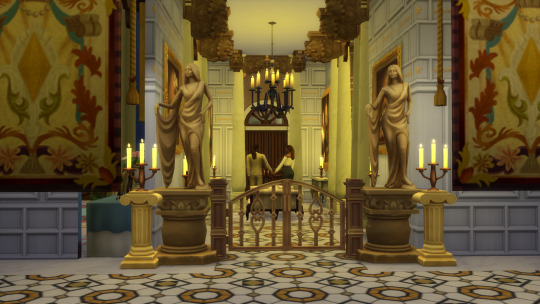
Darius: How are you feeling? You okay? You look beautiful by the way
Alysha: Thank you, I hope so. Cornelia spent so much time on my wardrobe. Darius, I'm never going to wear all those clothes, it's far too much!
Darius: You do look beautiful, always, with or without Cornelia's help. As to the clothes, you'll be surprised. The number of events we'll likely attend will need something new for each of them. Besides, I may have insisted you have enough to pick and choose.

Darius: But how are you feeling? Ready to face the world?

Alysha: I'm okay. Nervous and... and a little sad.

Darius: Sad! Why! whats wrong?
Alysha: I'm just a little sad this won't be our little secret anymore. Yes I know we've been engaged since January. And I know people have probably guessed we are, considering the number of events I have attended with you. But... this makes it official.

Darius: I know. It would have come out eventually, and at least we are making it known on our own terms, when we're ready. Besides, this way, you can wear the ring in public.
Alysha: Haha, yes, you're right. I have been dying to wear it some where other than at home...Speaking of home, did you speak to your Mother about us having to move? Do we?
Darius: Yes I did. We do unfortunately. I was hoping we would be able to stay in Sulani, but as working Imperial Royals we have to be close at hand. Living in Sulani isn't practical and excessive waste of money to be flying to and through. She did say we can keep it as a holiday home. She'll take the property back under the Imperial Crown. That way all members of our family can use it, and it won't lie empty. Mother did say, it is still essentially ours, but our official residence needs to be close by. Dubois House has just become available. The Earl and Countess of Orleans have just moved out to the country. The Estate is ours if we want it. It's also opposite my cousins, the Windsors, so well be surrounded by familiar faces.
Alysha: Sounds lovely... We'll be able to make it our own, yes?
Darius: Yes.

Marcus: They are ready for you, sir.
Darius: Thank you Marcus. Here we go...
Alysha: Just don't let me fall in these heels. I would like to make it to the other side relatively unscathed.
Darius: You mean like this!
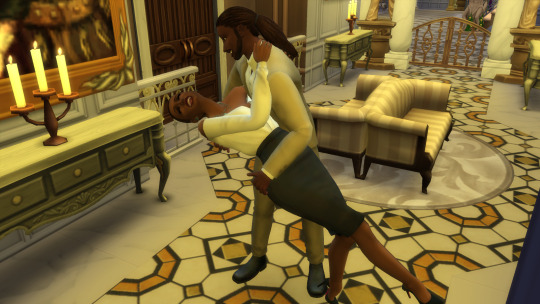
Alysha: Darius!!! No! Haha, you'll ruin Cornelia's work!
Darius: Haha, okay, okay.

Kiss... Darius presses his forehead to Alysha's
Darius: I love you...
Alysha: I love you too...

Darius: Come... let us greet the world...
#ts4 royal family#ts4 monarchy#ts4blacksims#ts4blackroyals#ts4 blackroyals#ts4 blacksims#ts4 blackroyalty#ts4monarchy#ts4 royalty#ts4 royal simblr
9 notes
·
View notes
Photo

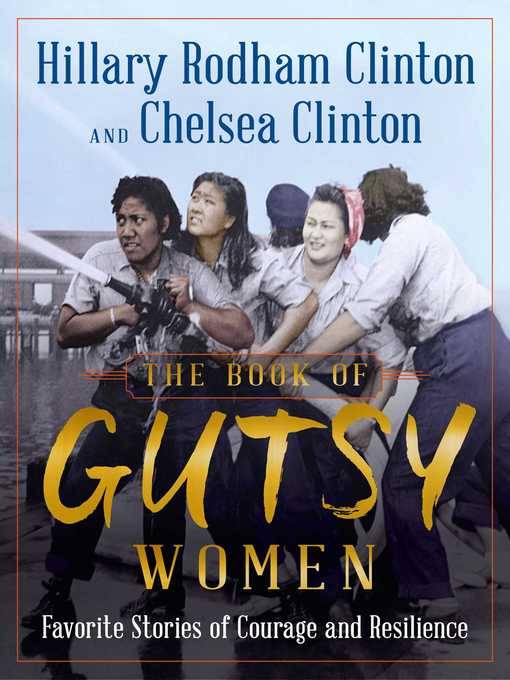
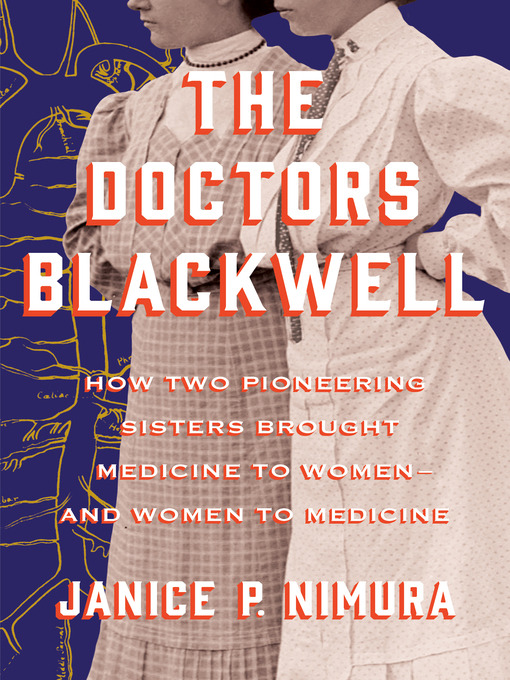

Women’s History Month: strength, power, and perseverance
The Women with Silver Wings The Inspiring True Story of the Women Airforce Service Pilots of World War II by Katherine Sharp Landdeck
When the Japanese attacked Pearl Harbor in December 1941, Cornelia Fort was already in the air. At twenty-two, Fort had escaped Nashville's debutante scene for a fresh start as a flight instructor in Hawaii. She and her student were in the middle of their lesson when the bombs began to fall, and they barely made it back to ground that morning. Still, when the U.S. Army Air Forces put out a call for women pilots to aid the war effort, Fort was one of the first to respond. She became one of just over 1,100 women from across the nation to make it through the Army's rigorous selection process and earn her silver wings.
The brainchild of trailblazing pilots Nancy Love and Jacqueline Cochran, the Women Airforce Service Pilots (WASP) gave women like Fort a chance to serve their country—and to prove that women aviators were just as skilled as men. While not authorized to serve in combat, the WASP helped train male pilots for service abroad, and ferried bombers and pursuits across the country. Thirty-eight WASP would not survive the war. But even taking into account these tragic losses, Love and Cochran's social experiment seemed to be a resounding success—until, with the tides of war turning, Congress clipped the women's wings. The program was disbanded, the women sent home. But the bonds they'd forged never failed, and over the next few decades they came together to fight for recognition as the military veterans they were—and for their place in history.
The Book of Gutsy Women: Favorite Stories of Courage and Resilience by Hillary Rodham Clinton, Chelsea Clinton
Ensuring the rights and opportunities of women and girls remains a big piece of the unfinished business of the twenty-first century. While there's a lot of work to do, we know that throughout history and around the globe women have overcome the toughest resistance imaginable to win victories that have made progress possible for all of us. That is the achievement of each of the women in this book.
So how did they do it? The answers are as unique as the women themselves. Civil rights activist Dorothy Height, LGBTQ trailblazer Edie Windsor, and swimmer Diana Nyad kept pushing forward, no matter what. Writers like Rachel Carson and Chimamanda Ngozi Adichie named something no one had dared talk about before. Historian Mary Beard used wit to open doors that were once closed, and Wangari Maathai, who sparked a movement to plant trees, understood the power of role modeling. Harriet Tubman and Malala Yousafzai looked fear in the face and persevered. Nearly every single one of these women was fiercely optimistic—they had faith that their actions could make a difference. And they were right.
To us, they are all gutsy women—leaders with the courage to stand up to the status quo, ask hard questions, and get the job done. So in the moments when the long haul seems awfully long, we hope you will draw strength from these stories. We do. Because if history shows one thing, it's that the world needs gutsy women.
The Doctors Blackwell: How Two Pioneering Sisters Brought Medicine to Women and Women to Medicine by Janice P. Nimura
Elizabeth Blackwell believed from an early age that she was destined for a mission beyond the scope of "ordinary" womanhood. Though the world at first recoiled at the notion of a woman studying medicine, her intelligence and intensity ultimately won her the acceptance of the male medical establishment. In 1849, she became the first woman in America to receive an M.D. She was soon joined in her iconic achievement by her younger sister, Emily, who was actually the more brilliant physician.
Exploring the sisters' allies, enemies, and enduring partnership, Janice P. Nimura presents a story of trial and triumph. Together, the Blackwells founded the New York Infirmary for Indigent Women and Children, the first hospital staffed entirely by women. Both sisters were tenacious and visionary, but their convictions did not always align with the emergence of women's rights—or with each other. From Bristol, Paris, and Edinburgh to the rising cities of antebellum America, this richly researched new biography celebrates two complicated pioneers who exploded the limits of possibility for women in medicine. As Elizabeth herself predicted, "a hundred years hence, women will not be what they are now."
Double Victory: How African American Women Broke Race and Gender Barriers to Help Win World War II by Cheryl Mullenbach
Double Victory tells the stories of African American women who did extraordinary things to help their country during World War II. In these pages young readers meet a range of remarkable women: war workers, political activists, military women, volunteers, and entertainers. Some, such as Mary McLeod Bethune and Lena Horne, were celebrated in their lifetimes and are well known today. But many others fought discrimination at home and abroad in order to contribute to the war effort yet were overlooked during those years and forgotten by later generations. Double Victory recovers the stories of these courageous women, such as Hazel Dixon Payne, the only woman to serve on the remote Alaska-Canadian Highway; Deverne Calloway, a Red Cross worker who led a protest at an army base in India; and Betty Murphy Phillips, the only black female overseas war correspondent. Offering a new and diverse perspective on the war and including source notes and a bibliography, Double Victory is an invaluable addition to any student's or history buff's bookshelf.
#womens history month#womens history#non-fiction#nonfiction#nonfiction books#nonfiction reads#history#history of women#book recs#tbr#booklr#to read#reading recommendations#recommended reading#library
1 note
·
View note
Photo

Sem título #2089 por mariandradde usando skinny jeans
#polyvore#moda#style#Vince#MANGO#Topshop#Yves Saint Laurent#Cornelia Webb#Windsor Smith#fashion#clothing
2 notes
·
View notes
Photo




WIP Angleterre Palace
Angleterre Palace inspired a lot by Buckingham Palace, Chatsworth House, Spencer House, Apsley House, and Windsor Castle. Angleterre Palace is the Windenburg Residence of the King and Queen and the Prince and Princess of the Isle as well as Princess Cornelia and Prince Robert.
Also thanks to @felixandresims and @thejim07 for the amazing CC!
10 notes
·
View notes
Text
Elizabeth Schuyler-Hamilton's Life: A Triumph Surrounded By Tragedy
Introduction
Elizabeth Schuyler-Hamilton was the wife of the first U.S. Treasury Secretary, Alexander Hamilton. Elizabeth Schuyler-Hamilton was described as "a brunette with the most good-natured, lively dark eyes that I ever saw, which threw a beam of good temper and benevolence over her whole countance." She was born August 9th, 1757 and died in November 1854 at the age of 97. Elizabeth was the second oldest sister of five sisters and was the second eldest child of the ten children of Philip Schuyler that lived. She married Alexander Hamilton in December 1780 and together they had eight children. Elizabeth Schuyler-Hamilton’s life was a triumph and a tragedy. Her life was successful because she established the first private orphanage in New York and she ensured her husband’s legacy. Her life was full of hardship because she married an extremely ambitious man who was unfaithful to her, she lost her eldest son and her husband within a three year timespan, and she suffered other hardships.
The Happiness and Heartaches of Marriage (1780-1797)
Elizabeth Schuyler met Alexander Hamilton in Morristown, New Jersey in 1780 where the Continental Army was stationed for winter that year. Elizabeth, commonly referred to as Eliza or Betsey, was in New Jersey to visit her aunt and uncle. Her uncle was a doctor for the Continental Army. It was there that she truly met Alexander Hamilton, an aide-de-camp to General George Washington. Hamilton was an extremely ambitious man who wanted to rise above his station and he dreamed of being someone in important in the new nation that he was fighting to create.
They had met in a brief passing three years earlier, when Hamilton went to Albany, New York to convince General Gates to surrender his troops to General Washington. Eliza was twenty-two years old when they met again and Hamilton was twenty-five. What followed was a whirlwind courtship in which Hamilton was apparently very taken with Eliza. Tench Tilghman, a fellow aide-de-camp to General Washington even said, “Hamilton is a gone man.”
Hamilton and Eliza wrote letters back and forth throughout the year of 1780 and on December 14, 1780, the couple was married at Eliza’s family home in Albany, Schuyler Mansion, which was lovingly nicknamed The Pastures. Eliza and Hamilton stayed at The Pastures for about a month before moving to New Windsor, New York where the Continental Army and General Washington were stationed at the time. Eliza ended up going back to The Pastures and Albany while Hamilton went of to fight in the Battle of Yorktown. During this time, Eliza was pregnant with her and Alexander’s first born child, a son, who they named Philip Hamilton, after Eliza’s father, Philip Schuyler. Hamilton returned from the war front in time to be able to witness his son’s birth.
Eliza and Hamilton continued to live at The Pastures for about two years. Eventually, Hamilton made enough money to move the family to a rented home in Manhattan. They lived there while Hamilton practiced law and remained there in the early days of his position as Treasury Secretary. The Hamiltons did eventually move to Philadelphia to follow the US capital and Hamilton’s work. During these years, Eliza and Hamilton had four more children: Angelica Hamilton, the first girl and three more boys, Alexander Hamilton Jr., James Alexander Hamilton, and John Church Hamilton. The family also took in an orphan by the name of Fanny Antil, who they raised as their own. Hamilton had known Antil's father. He had asked Hamilton and Eliza to take care of Fanny after the death of her mother.
In 1793, an outbreak of yellow fever hit the city of Philadelphia, hard. Yellow fever is a serious, flu-like disease that could have come from multiple sources during this time. Some symptoms of Yellow Fever are bleeding of the stomach, yellowing of the skin, extreme fatigue, body aches, and vomiting. Eliza, Hamilton, and their children left Philadephia for a small rented summer home that was two and half miles away from the city. During this time, Hamilton returned back to Philadelphia for work constantly. In September of 1793, Hamilton contracted Yellow Fever. The children were secluded to an adjoining house while Hamilton was sick. Eliza contracted the illness and their children were sent to stay at The Pastures. Fortunately, Eliza and Hamilton were cured quite quickly of the illness by a doctor named Edward Stevens.
In 1797, Hamilton published a pamphlet about having an affair with a woman by the name of Maria (mostly likely pronounced Mariah) Reynolds. He published the pamphlet because he had been accused of embezzling government money to Maria's husband, James Reynolds. In reality, Hamilton was paying hush money to James Reynolds during the two year period of the affair. He wanted to clear his name in regards to thr accusations, and in doing so, he became known for engaging in the first political sexual scandal. The publishing of the pamphlet humiliated Eliza, who was pregnant at the time with their sixth child.
The Struggles of Losing Loved Ones (1801-1804)
The year 1801 was very tragic for Eliza and her family. In March 1801, she lost one of her younger sisters, Peggy, after she endured a long battle with illness. Hamilton was in Albany when his sister-in-law passed away and he wrote a letter to Eliza to inform her of Peggy's passing. Eliza recieved the following letter:
"On Saturday, My Dear Eliza, your sister took leave of her sufferings and friends, I trust, to find repose and happiness in a better country.
Viewing all that she had endured for so long a time, I could not but feel a relief in the termination of the scene. She was sensible to the last and resigned to the important change.
Your father and mother are now calm. All is well as it can be; except for the dreadful ceremonies which custom seems to have imposed as indispensable in this pla(ce), and must which at every instant open anew the closing wounds of bleeding hearts. Tomorrow the funeral takes place. The day after I hope to set sail for N York.
I long to come to consol and comfort you my darling Betsey. Adieu my sweet Angel. Remember the duty of Christian Resignation.
Ever Yrs
AH"
Later that year, in November, Eliza also lost her eldest son, Philip. Philip had participated in a duel with a man by the name of George Eacker, over a speech that Racket had given in which he had insulted Hamilton. After Philip's death, Eliza and Hamilton's oldest daughter, Angelica, was never the same. She had a mental breakdown and eventually was unfit to live with her family. Six months after Philip's death, Eliza gave birth to the last child in the Hamilton family, whom she named Philip II.
The year 1804 was another terrible year for Eliza. In July of that year, Hamilton got into a duel with a man by the name of Aaron Burr. He didn’t survive the duel and left Eliza to raise seven young children. Hamilton left her with the following letter after his death:
"This letter, my very dear Eliza, will not be delivered to you, unless I shall first have terminated my earthly career; to begin, as I humbly hope from redeeming grace and divine mercy, a haply immortality.
If it had been possible for me to have avoided the interview, my live for you and my precious children would have been alone a decisive motive. But it was not possible, without sacrifices which would have rendered me unworthy of your esteem. I need not tell you of the pangs I feel, from the idea of quitting you and exposing you to the anguish which I know you would feel. Nor could I dwell on the topuc lest it should unman me. The consolation of Religion, my beloved, can alone support you; and these you have a right to enjoy. Fly to the bosom of your God and be comforted. With my last idea; I shall cherish the sweet hope of meeting you in a better world.
Adieu best of wives and best of Women. Embrace all my darling Children for me. Ever yours,
AH"
He also left her with the financial burden of debt he had acquired. Eliza was unable to keep the house that Hamilton had built for her and their family, named The Grange. It was sold in a public auction. Luckily, some friends of Hamilton and Eliza’s raised enough money for Eliza to buy the place back.
Another unfortunate death happened four months after Eliza lost Hamilton. Philip Schuyler, Eliza’s father also died. Her father’s land and house was divided up among his children. It wasn’t done peacefully though. Eliza’s younger sisters, Cornelia and Caty accused Eliza of accepting extra money from their father. Eliza denied this accusation and was shocked that her siblings even thought her capable of doing such something of that nature. If that wasn’t enough, Cornelia and Caty tried to take land that was rightfully Eliza’s. The feuding over this land started in 1804 and didn’t end until 1810. They went to court twice. There are no records of the first court case, which happened at some point between 1805 and 1807. Cornelia had gone to court with her case, and the judge had not ruled in her favor. In May of 1810, Eliza brought her own case to court. Eliza wanted the court to prohibit her siblings claims to the land in question. Eliza ended up winning the case because Caty and her husband never appeared in court. Her other sister, Cornelia and her husband, Washington Morton had passed. The land became Eliza’s to do what she pleased with it and if any relatives tried claim or seize the land, they would incur a fine $20, 000. Caty and Eliza did still keep in touch after this issue was settled though the dispute likely weakened their bond.
A Successful Struggle (1805-1854)
Eliza still struggled after the issues regarding the land were settled. She continued to be in debt and in 1814, she suffered the loss of another family member. Eliza’s eldest sister, Angelica was also taken by illness. Eliza had other struggles to deal with not pertaining to death or debt though. She needed to protect her husband’s legacy. Eliza constantly struggled to find a writer to compile her husband’s biography. She almost had someone to do the job, but the writer, named Frances Baylies ended up not being able to complete the biography. She sent him a letter requesting the papers the return of the papers she had sent him. In it, she wrote, “...your long silence to the other circumstances have I confess induced fear that something may have occurred to arrest your labors. If that is so, or it is found impractical for you to proceed, let me I pray you be informed that I may com-pensate your past troubles and put the papers without delay into other hands. I am thus frank and explicit because I am hourly admonished that my lide is drawing to a close and I am impatient to fulfil the sacred duty I owe to a beloved husband’s memory.” Eliza collected quite a bit of information, from many different people, about “her Hamilton” as she called him, while trying to get his biography written. She at one point wrote to Marquis de Lafayette, a man who was a friend to the Hamiltons and who with Hamilton had spent some time with in the military. She requested that he help her gather information. He responded with what he did and didn’t find. The biography about Hamilton was eventually written by Eliza and Hamilton’s son, John Church Hamilton, with help from Eliza.
Not only did Eliza help tell her husband’s story but she also did charity work. She was one of three women that co-founded the Orphan Asylum Society of the City of New York, which was the first private orphanage of New York City. It still exists today, now called The Graham Windham Home for Children. Eliza was there when the cornerstone for it’s two story wooden headquarters was laid in 1807. Eliza was so devoted to the cause of helping orphans, because her husband had been orphaned at the age of 12. For many years, Eliza was on the orphanage board and was the Deputy Director. In 1821, Eliza became the Head Directress and continued to be for the next twenty-seven years. She won a charter in 1818 to create the Hamilton Free School, which was the first educational institution in the Washington Heights section of Manhattan. Eliza died on Novemeber 9th, 1854 at the age of 97.
Conclusion
Elizabeth Schuyler-Hamilton’s life definitely had elements of tragedy and triumph. The tragedies that she suffered were that she married an extremely ambitious man who was unfaithful to her, lost her son and husband in duels, lost two of her sisters to illnesses, her eldest daughter to a mental breakdown, lost her father the same year she did her husband, had a squabble over land with her sisters, and dealt with debt and raising seven young children after her husband’s death. She triumphed over these tragedies by fighting to preserve her husband's legacy, surviving Yellow Fever, and most importantly established the first private orphanage in New York City. Despite all the tragedy that she suffered, she was a very strong and dedicated woman to the causes most important to her. Her legacy is now being recognized by millions through the popular musical, Hamilton. Her story impacts history in multiple ways. From a social standpoint, she made things better for orphans because before then they faced poverty, hunger, disease, and short life expectancies. When the orphanage was first established, there was no official child protective services and no public child welfare agencies. The creation of the orphanage was a major turning point to help establish the treatment of orphans that we have today. If it hadn’t been created, orphanages and child protective services might not exist today. Her story also impacts women’s history. Her life shows that a woman can do so much more in the world than just marry and have children. She is important in history because if she hadn’t fought to preserve her husband's legacy in writing, we wouldn't have a clear understanding of all that Alexander Hamilton accomplished as a founding father. Her story so powerful and inspiring because despite suffering public humiliation and several tragedies, she stayed strong, fought for what she believed in, and lived a long successful life.
12 notes
·
View notes
Photo

¡Bienvenidos a Barcelona!
Students and teachers are now off the planes, fully checked in and ready to explore the amazing city of Barcelona and take advantage of all that it has to offer for two whole weeks! Go out an explore the culture, the sports, the restaurants, the stores, the museums, the nightlife… There’s infinite possibilities and nothing’s better than to do it with your friends.
Just remember, for all of those travelling with Ancora or Atlantica, rooms have been assigned and roommates are final! So, in these two weeks we challenge you to post a private starter with one or both of your roommates and let us see how that interaction went. Did you get lucky when the rooms were assigned, or where you out of luck? What parts of Barcelona did you explore together? This is a mandatory even challenge and we can’t wait to see how it plays out!
You’ll find the list of roommates under the cut
Room 1
Ariel Triton
Raphaela Lights
Cornelia Hale
Room 2
Randall Boggs
Michiel Wazowski
Blake Florian
Room 3
Aurora Rose
Merida Dunbroch
Anna Arendelle
Room 4
Jackson Frost
Miguel Rivera
Victor Frankenstein
Room 5
Gabriella Sullivan
Vivianne Flieger
Perrie Sparks
Room 6
Jennifer Hachwrench
Gemma Pennington
Elena Avalor
Room 7
Andrew Anchorage
Louis Alliot
Tito Federico
Room 8
Kiara Lyon
Angel Adams
Violet Parr
Room 10
Eric Windsor
Scout Rogers
Toulouse Berlioz
Room 11
Ali Bashir
Finnegan Rider
Sammy Lyon
Room 12
Shenzi Wallace
Vitani Leon
Elyon Brown
Room 13
Adella Triton
Andrina Triton
Eleanor Van Helsing
Room 14
Héctor Rivera
Hades Vitalis
Poseidon Vitalis
Room 15
Danielle Bonfamille
Jane Porter
Coco Rivera
Room 16
Charles Winchester
Archimedes Hazard-Perry
Hercules Mitzou
Room 17
Sally Finkelstein
Hannah Limón
Maria Posada
Room 18
Lola Von Schweenz
Talia McKinnon
Charlotte Labouff
Room 19
Michael Yagoobian
Jack Parr
Dash Parr
Room 20
Guadalupe Reyes
Lillian Tiger
Rosa Aranha
Room 21
Lilo Pelekai
Daisy Donovan
Anastasia Romanov
Room 22
Ashley Spinelli
Penny Proud
Minnie Morales
Room 23
Ella Glass
Giselle Andrews
Caroline Farrow
Room 24
Nicholas Wilde
Baron Armstrong
Niko Stone
Room 25
Aquata Triton
Moana Waialiki
Inés Reyes
At the Dorantes’ house:
Room 1: Miguel Dorante + Tulio Dorante
Room 2: Jack Skellington
Individual rooms (for those joining the party on their own means):
Matthew Hawthorne (+ Shay Grimshaw)
Lucien + Diana Tremaine
Richmond Shepard
Atticus Eeyore
Megara Pavlis
Johnathan Hopper
Sky Llewelyn
Peter Woods
Astrid Hofferson
Maximus Cheval
Elsa Arendelle
Trusty Ryan
Tam Calhoun
***If your character is going on the trip and doesn’t show up on the list, or if one of the charas listed decided not to attend, please message us on the main so we can do the necessary adjustments.
4 notes
·
View notes
Text
Chapter XI: The Civil War, William, Rachel, and Massachusetts
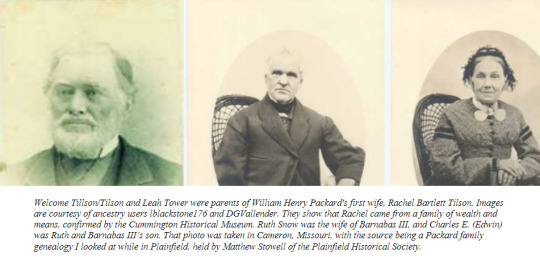
While the Packard family was gathering in Cameron, Missouri, Barnabas and Ruth’s son, William Henry, was still living in Massachusetts. William H. was born on October 1, 1822, in Plainfield, and became a farmer who settled in Windsor, a community not far from Plainfield and Cummington. [231] On May 20, 1847, at age 25, his life changed. On that day, he married a woman named Rachel Bartlett Tillson whose parents were Welcome Tillson (also spelled Tilson) and Leah Tower. [232] Welcome was the son of a Revolutionary War soldier named Ephrahim Tillson, Jr. and Fear Waterman, which could make him a “patriot” by DAR standards.
Three years later, in 1850, a 27-year-old William was living with his wife, Rachel, 25-years-old, and their son, Welcome Tilson Packard in Windsor, Berkshire, Massachusetts. [233] Windsor was (and still is) a small rural, farming, community, which behaves “like a large family” since it is a small town. The fact that Welcome is on the census, makes it clear that he was born in 1848, rather than Jun. 27, 1850 as RBM III states. The story goes that he married a person named “Lucy.” It turns out that this story is accurate. While his estate was probated in Massachusetts in about 1889, he lived the last years of his life in Canada. At age 32, in 1881, he was living in Rouville, Quebec. Married to Lucia, he was a Protestant bookkeeper. [234] By 1891, Lucia, then called Lucy, was a Congregationalist still living in Canada, but was a widow, in Shefford instead of Rouville, living with four other individuals, likely her children, some of whom were farmers.
The 1855 Massachusetts State Census expands the Packard family story, telling about those children of William H. and Rachel born between 1850 and 1855. [255] Still living in Windsor, William (age 30) led the household, with Rachel (age 34) by his side, and had four children living in the household: Welcome (age 7), Alice Cornelia (age 5), Cyrus Winfield (age 2), and William Luther (age 1). As in 1850, the Packards were living right next to the Mason family. Cyrus would marry a daughter of the same family in later years who was born about ten miles away in Cummington. Alice was born in July 1850. She would marry Charles Fuller sometime before 1881, possibly in 1880. She lived in Quebec, Brome, Canada from 1881 to 1921, at least, and was a Universalist, with her husband Charles as a farmer, like his son Chillis (age 16 year), and likely her son Sylvanus (born in March 1881). In 1891, the family were farmers, and she was not a Universalist but was still a Christian. In 1901, she was a widow (meaning Charles had died) living in Missisquoi, was Congregationalist, and living with her farmer son, Sylvanus. Her birth date was pegged as July 21, 1850. [236] By 1911, she would be a mother, widow, and still living under Sylvanus’s roof. By that point both were Methodists. In 1921, she was living in Sylvanus’s household, and is age 70. [237] Her life after that point is not known.
The other two children listed, Cyrus Winfield and William Luther are worth noting. Cyrus, who is one of the subjects of the next chapter was possibly, as Bob Mills says, “destined to out produce his father with 12 children, although it took three wives to do it!” Born in October 1852, Cyrus would live in Windsor when his father mortgaged 70 acres of land he owned (1866), likely including the same 30 acres he bought in November 1847 when he was still living in Plainfield. [238] Then there was William Luther Packard. Born on August 3, 1854, he would marry a woman named Lucy Olive Stetson in 1882. [239] He would have three children with Lucy: Minnie Rachel (1884-1960), Anna Emeline (1886-1982), and Clayton Luther (1901-1936). On September 24, 1881, his brother Cyrus, also called “Winfield Packard” for a certain part of his life, would purchase 112 acres from him. More about that transaction will be discussed in the next chapter. [240] Before William Luther’s death in 1941, and Lucy’s death in 1968, they would continue to live in Plainfield. In 1900, William would be a full-time farmer, with their children living with them, along with Lucy’s mother, Sarah. [241] In later years, he would hold the same occupation, living on West Main Street, and the children of William L. and Lucy would be living on the farm, moving to Greenfield, Massachusetts by 1930.
The 1860 U.S. Federal Census further reveals the life of William H., Rachel, and their children. [242] While some of the names are distorted, it is clear that William (age 39), a farmer, and Rachel (age 35) were part of an agricultural family. The farm in Windsor had a real estate of $1,500 while the personal estate is almost worth $700. Additionally, all of the Packard children except one-year-old Frank, attended school that year. Among these children were two which had been born between 1855 and 1860: Joseph A. (b. 1856), and Frank (b. 1859). [243] Joseph was reported by one family historian as marrying a woman named “Minnie” and emigrating to Canada as Alice did. A 25-year-old man named Joseph Packard is listed as living in Rouville, Quebec, the same area in which Welcome T. was living, with a Packard family, working as a farm hand and a Congregationalist. [244] The dates match up, so this is likely the same Joseph who was born in the United States, although it claims he was born in Nova Scotia, which would be a mistake by the census enumerator. He is not listed in the 1891 census.
In 1862, the family of William H. and Rachel would be drawn into the Civil War. Cyrus was age 7 when the war itself began so he did not fight in the war. However, the older Packards did participate. William’s brother, Roswell, a unmarried Massachusetts farmer, fought, enlisting on September 2, 1862. [245] Unlike William H., he enlisted in Company F of the Massachusetts 46th Infantry Regiment, became a corporal on June 9, 1863, and was mustered out on July 29 in Hampden Park, Springfield, Massachusetts. However, William H. had a different experience than Roswell.
On November 3, 1862, he enlisted in the Union Army at Camp Brigg in Pittsfield. He was 40 years old at the time, so Bob Mills may be right he did it to “escape the children or the farm.” He would serve as a private within Company I of the 49th Regiment of Massachusetts Volunteer Militia. As part of that unit, he would see action in Baton Rouge, Louisiana, and he would be discharged honorably on September 1, 1863 after 10 months of service when his unit disbanded at Pittsfield. [246] But this short description does not do his unit justice. He served for 9-10 months in the 49th Regiment commanded first by Captain William Francis Bartlett. The unit, after moving from area to area, gained a “reputation for good discipline.” It left from Long Island to Louisiana on the Illinois steamer in January 1863, arriving in New Orleans by early February. [247] The National Park Service gives a nice overview. The unit was attached to 1st Brigade, 1st Division, of the 19th Army Corp. It engaged in reconnaissance on Port Hudson in March, and then fought in the siege of the same area in May through July, off and on. Beyond this, it fought at Plain's Store and at Cox's Plantation (“line of Bayou Lafourche”) during the summer. [248] In fighting at Port Hudson, it was assisting Farragut’s union fleet. During its time in service, 2 officers were killed, 28 men killed or mortally wounded, and 84 men killed by disease. [249] By August 9, after staying in the nearby area, it left New Orleans, going on the Templer steamer to Cairo, Illinois, and taking a train to Pittsfield, where it arrived on August 22. Once there, there was likely an “enthusiastic reception” (with Rachel and family likely in attendance) and it was “mustered out of the United States service” on September 1.
The battles the unit was engaged in were sometimes Union victories. This was the case in the siege of Port Hudson from May to July 1863, allowing the Mississippi River to be open to “Union navigation from its source to New Orleans” and the fight at Plains Store, which closed the last “Confederate escape route from Port Hudson,” with Confederates dragging away some of “their cannons by hand rather than abandon them to the Yankees.” [250] However there were some Confederate victories as well. One such victory was at Cox’s Plantation. Two Union divisions “marched up Bayou Lafourche” but as they advanced, “skirmishing occurred on July 11 and 12” and on the 13th, at Kock's Plantation or Saint Emma Plantation, “they met Rebel skirmishers that forced them back.” After that, the Confederates, “flung their might against the Union troops” which eventually fell back “to the protection of the guns in Fort Butler at Donaldsonville,” and as a result, the Confederates were left “in control of the interior.” [251] In a broader context, the siege of Port Hudson was part of the offensive up the Mississippi River. Furthermore, with the fall of Vicksburg, and surrender of Port Hudson later that month, the Union was going “unvexed to the sea” as Lincoln put it, or as Confederate Ordinance Chief Josiah Gorgas wrote, “absolute ruin seems to be our portion.” [252] Simply put, the surrender gave the Union “control over the entire Mississippi River, cutting off important states such as Arkansas and Texas” as the National Archives notes. The siege, the longest in U.S. history, was a massive operation, with 30,000 Union troops under the command of General Nathaniel Banks surrounding the Mississippi town and Confederate stronghold. It was in “cooperation with General U.S. Grants attack on Vicksburg, Mississippi” and was notable since it was “the first time African-American troops were used in combat” coalescing in the Corps D'Afrique, a regiment which “had been raised and supplied on orders from General Banks.” [253] 600 Black soldiers died in the fierce battle, fighting the Confederates.
This victory was one of the most significant days of the war, and 41-year-old William H. was part of the reason, along with his valiant unit. The battle changed the tide of war to favor the Union, which would emerge victorious after a little less than two more bloody years. For this, descendants of the Packard family should be undeniably proud, especially since other descendants fought for the Union as well. William had eagerly answered the call to serve as a private, going from the “free” north to fight in the slaveowning South, even passing through enemy territory on the steamer to New Orleans, after the Union was advancing more into the South. [254] He possibly enlisted not only out of feelings of patriotism but to prove his “manliness.” The war, ended by higher morale and power by the Union, rather than the supplies which were manufactured by the North, ended “their curse, slavery” of Blacks, as Quartermaster Henry T. Johns of the same 49th regiment, which he called a “historic name worthy of the old Commonwealth” which was comprised of a “large number of farmers and farmer’s boys.” Slavery was made a “putrid corpse” (as said by Henry T. Johns) except in the case of punishment for crimes as codified in the 13th Amendment.
William H., one of the 17 individuals who enlisted in Windsor, with pay of only $13 a month, had a number of fellow soldiers that he got to know very well. One of these was Corporal C.J. Ingell. While he was a lowly solder, William was mentioned in Ingell’s diary in 1863 because he shared a tent with this higher ranking officer, along with two other individuals: Corporal Milo Spring and Private Ira Higgins in March 22. [255] 13 days later on April 4, he carried William (and Higgins)’s backpacks, which he deposited in their shared tent. It would not be until July 30 that he would allude to Packard, saying that private Lewis Crosier ate “supper with us,” with us referring to Milo Spring, William, and himself. [256] In his final entry mentioning Packard, on August 2, he says that he washed his clothes in the nearby river along with William. Such camaraderie would not happen again in William H.’s life other than among his immediate family.
Two years after arriving in Pittsfield and going to his home in Windsor, William H. was back on the farm. Falsely labeled on the census, he was a farmer and legal voter, living with his wife Rachel and eight children: Welcome (age 17), Cornelia (age 14), Cyrus (age 12), William L. (age 10), Joseph (age nine), Frank (age six), Fred (age four), and Mary (age two). Little is known about Mary other than that she was born on August 2, 1862, before William went off to Louisiana to fight as part of the 49th Regiment. This birth date is possible since the common length of a pregnancy is 38-41 weeks (266-287 days), based on recent studies, meaning that Rachel’s pregnancy began in 1861, before William engaged in his military service. [257] Mary would die on July 27, 1887 at 24 years, 11 months, nine days old. Nothing else can be determined other than a two-year-old named James Otis was living with them.

The 1870 U.S. Federal Census is much clearer. It shows William H. (age 48) as a farmer and legal citizen, along with his son Welcome (age 22) while Rachel (age 45) and Alice (age 20) “keep house,” meaning that they maintain the home and manage the household. Adding to this, the farm itself had a worth of $5,000 with a personal estate of $1,400. [258] William L. (age 16), Joseph (age 14), and Frank (age 12), also worked on the farm as farm hands, with the latter two also attending school. Freddie (age 10) and Mary (age 8) both attended school and were not farm hands. The absence of Cyrus cannot be fully explained. Henry, age 4, listed last, stayed “at home.” Henry, whose full name was Henry Clark Packard, was born on April 28, 1866, and would die in 1924. He would become a deacon and manager of a West Cummington church, be a member of Plainfield Grange (an organization that assisted farmers), and serve as a selectman. He married Bertha Bell Gurney on December 14, 1890, who would die on August 1, 1960, having four children with her: William Albert (1894-1983), Muriel (1900-1960), Margery, and William Henry, birth dates unknown for the last two. [259] Bertha was born to Albert N. Gurney and Sarah O. Dunham in Plainfield on February 3, 1870. She was an only child, with her mother maintaining the household and her father a farmer, living close to another Packard family. [260]

This would seem to put her at the same class level as Henry. However, the way she looks in a photograph cataloged by the Plainfield Historical Society makes her seem very proper. [261] Nothing else about her clothing or family, in terms of their economic status, is known. But, if her clothes are any indication, her family was not made up of mere farmers. The 1880 census is as informative as the 1870 one for the Packard family. [262] It is the last one that lists Rachel B. Tillson, and shows them now living in Plainfield, ten miles away from Windsor. While William H. (age 57) was still a farmer, his wife Rachel (age 55) has a “Keeping House” occupation, meaning that she is maintaining the house, William L. (age 25, incorrectly called “Luther W.”) is a farmer, Mary (age 17) has no occupation, Fred (age 20) is a farmer, and Henry (age 14) is at school. On January 30, 1881, Rachel would die in Plainfield and have a probate. [263] After her death, he re-married to a woman named Mary Ann (Dyer) Brackett on October, 26, 1887.

Mary Dyer (Brackett)
She was the daughter of Bela Dyer (whose parents wee Jesse Dyer of Ashfield and Sarah Pool) and Deborah White, and had one previous marriage: to Jonathan Brackett in Feb. 29, 1850, living in Scarburg, Vermont “for some years” with Jonathan running a tannery until his death on Feb. 2, 1884. While no children were reported from this marriage, there is a photograph of a harsh-looking woman. [264] In the last years of his life, in Plainfield, William H. would discharge his land in Berkshire County (October 1890) and would die in 1896 with a probate. Nothing else about his life or that of Mary Ann Dyer is known.
Notes
[231] Massachusetts, Town and Vital Records, 1620-1988; Gravestone of William Henry Packard on Find A Grave.
[232] Jordan Dodd and Liahona Research, Massachusetts, Marriages, 1633-1850, Ancestry.com, 2005; Ancestry.com, Massachusetts, Marriage Records, 1840-1915, Ancestry.com Operations, Inc., 2013; Ancestry.com, The Tilson genealogy: from Edmond Tilson at Plymouth, N E, 1638 to 1911, North America, Family Histories, 1500-2000, Ancestry.com, 2016; gravestone of Welcome Tilson; gravestone of Leah Tower; gravestone of Ephrahim Tillson, Jr.; gravestone of Fear Waterman; William W. Streeter and Daphne H. Morris, The Vital Records of Cummington, Massachusetts 1762-1900 (Cummington, MA: William W. Streeter, 1979), 141. The Tillson family was originally from England, like the Packards as noted in Mercer V. Tilson, The Tilson genealogy (Plymouth: The Memorial Press, 1908), 368.
[233] "United States Census, 1850," FamilySearch, William H Packard, Windsor, Berkshire, Massachusetts, United States; National Archives, NARA M432; memorial page for Welcome Tilson Packard.
[234] Welleome T. PACHERD, 1881 Census, Rouville, Quebec, District 63, Sub District St. Paul-d'Abbotsford, Sub District I, Division 2, Page 2, Microfilm C-13203, RG31 - Statistics Canada, Item 5616267, courtesy of Library and Archives Canada; Lucia PACHERD, 1881 Census, Rouville, Quebec, District 63, Sub District St. Paul-d'Abbotsford, Sub District I, Division 2, Page 2, Microfilm C-13203, RG31 - Statistics Canada, Item 5616268, courtesy of Library and Archives Canada; Lucy Packard, 1891 Census, Shefford, Quebec, District 187, Sub District Granby, Sub District C, Division 2, Page 16-17, Microfilm T-6421, RG31 - Statistics Canada, Item 4561954, courtesy of Library and Archives Canada. Also see the memorial page for Lucia/Lucy Packard on Find A Grave.
[235] "Massachusetts State Census, 1855," database with images, FamilySearch, Wm H Packard, Windsor, Berkshire, Massachusetts, United States; State Archives, Boston; FHL microfilm 953,974. It is also reprinted here.
[236] Alice Fuller, 1881 Census, Brome, Quebec, District 60, Sub District Farnham East, Sub District F, Page 4, Microfilm C-13202, RG31 - Statistics Canada, Item 5559154, courtesy of Library and Archives Canada; Alice P. Fuller, 1891 Census, Brome, Quebec, District 143, Sub District Farnham East, Sub District D, Division 2, Page 20, Microfilm T-6388, RG31 -Statistics Canada, Item 3391952, courtesy of Library and Archives Canada. In 1891 there was a person age 66 named “N L” living in their household. Two other individuals, one of whom had the last name of Fuller was living with them. The first one claims she was born in Nova Scotia, but this is an error as the next one notes that she was born in the US. Allice C. Fuller, 1901 Census, Missisquoi, Quebec, District 170, Sub District Dunham, Sub District C, Division 3, Page 12, Microfilm T-6531, RG31 - Statistics Canada, Item 5956822, courtesy of Library and Archives Canada. It would also say her ethnic origin was Scotch. It would also reveal she emigrated to Canada in 1877, three years earlier than previously established. Also see her memorial page on Find A Grave.
[237] Alice C. Fuller, 1911 Census, Brome, Quebec, District 149, Sub District Brome Township, West Brome Village, Sub District 6, Page 11, Microfilm T-20417, RG31 - Statistics Canada, Item 8389884, courtesy of Library and Archives Canada; 1921 Census of Canada, Brome (Township), West Brome (Village), Brome, Quebec, Sixth Census of Canada, RG 31. Folder 108, Page 2, Library and Archives Canada, 2013, Series RG31, Statistics Canada Fonds. Courtesy of Ancestry.com. Sylvanne is married to Mary (age 40) and has two children: Sylvanne (age 5) and Elizabeth (age 4), both with the last name of Fuller. This census notes she was born in Massachusetts in July 1860, but they are off by 10 years.
[238] Gravestone of Cyrus Packard; Mortgage by Marcia L. Clark of East Hampton from William Henry Packard of Windsor, Apr. 30, 1866, Massachusetts Land Records, 1620-1986, Berkshire, Deeds 1866-1867 vol 107-109, p. 309, image 195 of 328, courtesy of Family Search; Land Purchase of William H. Packard of Plainfield, Nov. 10, 1847, Massachusetts Land Records, 1620-1986, Berkshire, Deeds 1848-1851 vol 67-68, p. 434, image 520 of 614, courtesy of Family Search. This means he was well settled in Windsor by the time of 1855. As it turns out he was near the land of Ariel Ayres, the family which his sister Cornelia married into as noted in the last chapter.
[239] Gravestones of Lucy O. Packard, William Luther Packard, Minnie, Anna, and Clayton. Clayton would marry Clarissa Merrill Truesdell LaClaire (1908 – 2009). Lucy would die in 1968. The 1900 census says they were married in 1882. The Packard family file, at the Cummington Historical Museum notes that Lucy Stetson of Greenfield spent "many years" in Plainfield, living by a Plainfield pond. This confirms other information we know about her.
[240] Agreement between William L. Packard and Winfield Packard, Sept. 24, 1881, unindexed documents, book 367, page 475 via http://www.masslandrecords.com/Hampshire/, click on "unindexed property search." Clark Packard (b. 1808), child of Philander and “Polly” Hill, is referenced in this transaction as well.
[241] 1900 U.S. Federal Census, Plainfield, Hampshire, Massachusetts, Twelfth Census, Enumeration District 644, Bureau of the Census, National Archives, NARA T623, Roll 654, Page 1B, courtesy of Ancestry.com; 1910 U.S. Federal Census, Plainfield, Hampshire, Massachusetts, Thirteenth Census, Enumeration District 712, Bureau of the Census, National Archives, NARA T624, Roll 594, Page 1A, courtesy of Ancestry.com; 1930 U.S. Federal Census, Greenfield, Franklin, Massachusetts, Fifteenth Census, Enumeration District 12, Bureau of the Census, National Archives, NARA T626, Roll 904, Page 7B; 1940 U.S. Federal Census, Greenfield, Franklin, Massachusetts, Sixteenth Census, Enumeration District 6- 21, Bureau of the Census, National Archives, NARA T627, Roll 1591, Page 5B.
[242] "United States Census, 1860", database with images, FamilySearch , Wm H Packard, 1860.
[243] Fred is in the 1880 census, while Massachusetts, Death Records, 1841-1915 and Massachusetts, Town and Vital Records, 1620-1988 say he died in 1884. Some note two other children: Benjamin Franklin Packard (born Sept. 9, 1858) who married Julia E. Beals, and Fred R. born in 1860. Likely “Frank” is the same as Benjamin Franklin Packard, whereas Fred may have not been born yet. Memorial pages for Joseph Alden Packard and Benjamin Franklin “Frank” Packard.
[244] Joseph Packard, 1881 Census, Rouville, Quebec, District 60, Sub District Farnham East, Sub District F, Page 49, Microfilm C-13202, RG31 - Statistics Canada, Item 5560282, courtesy of Library and Archives Canada.
[245] Historical Data Systems, U.S., Civil War Soldier Records and Profiles, 1861-1865, Ancestry.com, 2009; National Archives and Records Administration (NARA); Washington, D.C.; Consolidated Lists of Civil War Draft Registration Records (Provost Marshal General's Bureau; Consolidated Enrollment Lists, 1863-1865); Record Group: 110, Records of the Provost Marshal; courtesy of Ancestry.com. Nahum, Osamus, Harrison E.,& Charles E. Packard also fought in the war.
[246] His military records confirms this paragraph. It also shows that he was 40 years old and a farmer when he enlisted, with no other info. provided. The NPS database also confirms this while showing a John K. Packard who enlisted in another Massachusetts Company. He is likely not related.
[247] It was transferred to Baton Rouge. Later, in May, it remained at Baton Rouge for two months as it suffered for sickness. It arrived in New Orleans by early February, where it stayed until mid-February. Unit history reprinted here and here.
[248] It stayed in Donaldsonville until Aug. 1st then it went back to Baton Rouge, receiving prisoners lost during the fight at Bayou Lafourche against Confederate forces.
[249] NPS, “Union Massachusetts Volunteers 49th Regiment, Massachusetts Infantry (Militia),” accessed Aug. 15, 2017
[250] Battle of Port Hudson & at Plains Store; Philip Faller, “Siege of Port Hudson,” Civil War Trust, accessed Jan. 14, 2017.
[251] NPS, Battle of Cox’s Plantation, accessed Aug. 15, 2017.
[252] Neil Kagan and Stephen Hyslop, Eyewitness to the Civil War: The Complete History from Secession to Reconstruction (Washington, D.C.: National Geographic, 2006), 190, 211; New York Times, “THE SIEGE OF PORT HUDSON.; Casualties in the One Hundred and Thirtythird Regiment N.Y.V.,” Aug. 8, 1863; National Archives, “Nathaniel Pretence Banks,” Aug 15, 2016; Philip Faller, “Siege of Port Hudson.”
[253] “The Battle of Port Hudson: A More Detailed Account,” part of the Battle of Port Hudson, accessed July 14, 2017; National Park Service, “Port Hudson,” accessed on July 14, 2017; Louisiana Department of Culture Recreation and Tourism, “Port Hudson Historic Site,” 2017. During the battle, since he was part of the 19th Corps, William was one of the soldiers that fought on Northeast front of the siege under General Banks, which can be concurred from this map and this map. There is a photo of the officers of the regiment but not the soldiers. The fierce battle, with the Confederates, who had eighty foot bluffs around Port Hudson, gun emplacements, and much more, is also shown in this painting. As one Union officer, Captain John William DeFrost, recounted, “after the assault came twenty-four days more of sharp-shooting. We grew weak and nervous under the influences of summer heat, confinement, bad food, and constant exposure to danger. Men who had done well enough in battle broke down under the monotonous worry, and went to the rear invalided. From rain, perspiration, sleeping on the ground, and lack of water for washing, our clothing became stiffened and caked with inground mud. Lice appeared, increased, swarmed, infesting the entire gully, dropping upon us from the dry leaves of our bough-built shanties, and making life a disgrace as well as a nuisance.”
[254] Kagan and Hyslop, pp 19, 66, 74, 94, 99-100, 128-129; Howard Zinn, A People’s History of the United States 1492 –Present (New York: HarperCollins, 2005, Fifth Edition), pp 190-198, 237-240; Henry T. Johns, Life with the Forty-Ninth Massachusetts Volunteers (Pittsfield, MA: Published for the Author, 1864), pp 7, 10-11, 14-15, 21, 25, 27, 34, 37, 39, 49, 53, 57, 61, 66-67, 73, 78, 85, 96-97, 105-106, 123, 134, 140, 152-153, 159-160, 164, 170, 172, 175, 177, 192, 206-210, 214, 220, 228, 241, 254, 259, 271, 275, 286-287, 293, 302-303, 322, 335-337, 339-341, 347-348, 354, 356-359, 361, 364, 368, 375, 377, 380, 382, 390. On Page 390 of this first-hand and flowery account of the regiment, William is listed on roll of Company I (“Packard, W.H.”) in September 1863 when it mustered out of service.
[255] Unknown List, Lists of Soldiers, C.J. Ingell Civil War Diaries, accessed July 14, 2017; “The following are people that are mentioned in Cheney Jackson Ingell's Civil War Diaries,” C.J. Ingell Civil War Diaries, accessed July 14, 2017; March 22 entry, March ‘63, C.J. Ingell Civil War Diaries, accessed July 14, 2017; April 4 entry, April ‘63, C.J. Ingell Civil War Diaries, accessed July 14, 2017. Throughout his entries he calls William by “Packard” rather than his first name.
[256] July 30 entry, July ‘63, C.J. Ingell Civil War Diaries, accessed July 14, 2017; August 2 entry, August ‘63, C.J. Ingell Civil War Diaries, accessed July 14, 2017.
[257] Gravestone of Mary M. Packard; Packard Household, Massachusetts State Census of 1865, Windsor, Berkshire.
[258] Packard Household, United States Census of 1870, National Archives, NARA M593, p. 5; Gravestone of Henry Clark Packard.
[259] Gravestones of Bertha Bell Gurney, William Albert Packard, and Muriel Packard; Birth of Bertha Bell Gurney, Feb. 3, 1870, Massachusetts Births and Christenings, 1639-1915, p. 10; Household of the Gurneys, US Census of 1900, Plainfield, Northampton, Hampshire, Massachusetts, enumeration district 644, National Archives, NARA T623; Marriage of Bertha B. Gurney and Henry Clark Packard, Dec. 14, 1890, Massachusetts Marriages, 1695-1910; William W. Streeter and Daphne H. Morris, The Vital Records of Cummington, Massachusetts 1762-1900 (Cummington, MA: William W. Streeter, 1979), 140. Bertha was the daughter of Albert N. Gurney and Sarah Dunham.
[260] Gurney Household, US Census of 1870, Plainfield, Massachusetts, National Archives, NARA M593, p. 10. Albert had grown up as an adopted child of the Joy family as the 1850, 1855, and 1865 censuses attest.
[261] Bertha Bell Gurney was wife of Henry Clark Packard as noted in this chapter and by the historical society. The original caption was “Bertha Gurney Packard – mother of William A.” William A. or William Albert was born in 1894.
[262] Packard Household, Plainfield, Hampshire, Massachusetts, United States Census of 1880, enumeration district 334, sheet 155B, National Archives, NARA T9, roll 537. “Charles Packard” who is mentioned as a child of William H. and Rachel would be listed, is not, making me think that this person was added due to an error by Packard family genealogists. Perhaps William H. was preparing for this by buying 167 acres in Cummington from a Lozina G. Packard in 1874. It is possible this land was the family farm.
[263] William W. Streeter and Daphne H. Morris, The Vital Records of Cummington, Massachusetts 1762-1900 (Cummington, MA: William W. Streeter, 1979), 216
[264] This is courtesy of DGVallender on Ancestry. This image does not have a backing like ones noted by this genealogist, but it does show who she is as a person. See p. 140 and 142 of Dyer’s History of the town of Plainfield, Hampshire County, Mass., from its settlement to 1891 (Northampton, MA: Press of Gazette Printing, 1891); Discharging land, October 1890, Massachusetts Land Records, 1620-1986, Berkshire, Deeds vol 151-153, p. 72, image 584 of 838.
Note: This was originally posted on Sept. 14, 2018 on the main Packed with Packards WordPress blog (it can also be found on the Wayback Machine here). My research is still ongoing, so some conclusions in this piece may change in the future.
© 2018-2022 Burkely Hermann. All rights reserved.
#civil war#massachusetts#genealogy#family history#genealogy research#packards#farming#1890s#women#plainfield#vermont#marriages#census#berkshire county#hampshire county
0 notes
Text
Repose
Rated M (angst, sleeping beauty au, mentions of sex, adult themes
Word count: 2626/42677
Read on AO3
Chapter 15
The drive to Windsor castle felt something like the first time Louise drove Phil there. Fear and uncertainty had brought tension then but now it was magnified. Now, Phil knew what was at stake. He also knew he wasn’t wanted there and that he may have a fight ahead of him much more daunting than the fight to get in had been. Phil has never been much of a fighter, always more likely to walk away, turn the other cheek. Now he hoped against hope for a fight because a fight meant Dan was ok, that there’s something to fight for. The alternative was unthinkable. His stomach turned when he thought of how easily he had let Dan get away all those years ago. Everything could have been different if he had simply had the courage to speak up, say the words, hold on tighter. That wasn’t a mistake he was going to make again. He had let himself consider the worst case scenario, he’d fallen apart, gotten it out of his system, and now he was going to stand up and be what Dan needed him to be.
Walking up the path to the castle gate, the scene was so different from the first time. There was a small group of protesters and an even smaller gaggle of women waiting on the lawn. A large steel grate had been pulled closed at the gate that lead to the entrance to Dan’s operating theatre and there was only one guard standing in the center of the walk. It was obvious the excitement had passed, the royal family had succeeded at appeasing the public.
Phil and Louise walked in the grass toward the protesters, hoping the single guard wouldn’t notice Phil. The idea that he could be seen as a threat was ridiculous but Phil couldn’t imagine the stories Walter must be telling. Phil had to be careful. He didn’t want to risk being carted away before he was able to see Dan. Cautiously, Louise approached the gate with Phil a few feet behind. Inside, near the door that would lead to the Prince, stood Dennis.
Louise ran back to Phil, whisper shouting, “It’s that guard, the one you know. Phil, he must be ok. Why would they guard an empty room? He must still be in there.”
“He’s still in there, I feel it. But that doesn’t mean he’s ok.” Phil said, his eyes searching for some comfort in Louise’s hopeful expression. “I’m going to go talk to him. Stay close.”
Phil’s hands gripped the bars of the steel grate that stood between him and what he now realized was his future. Dennis look up and sighed heavily, scrubbing his hands over his face in frustration. He walked to Phil and spoke, low enough so that no one else could hear.
“Phil. Buddy, you know my hands are tied here. There’s nothing I can do. Prince Walter would put me away for treason. He’s been very clear.”
“Did you deliver that box, Dennis?” Phil asked. Dennis said nothing but returned to his post by the door. “Tell Walter I’m here, Dennis. Let me see him. We can work something out.”
Dennis stared forward, unflinching. “You don’t want to see Walter, Phil. Trust me, you don’t.”
“Tell me he’s ok, Dennis. Or at least tell me he’s alive.” Phil was starting to panic.
Dennis said, “he’s alive,” and cast a sideways glance at Phil that sent a chill up his spine.
“Oh my god. I need to see him. Dennis please.”
Dennis’ brow creased, he shifted on his feet and swallowed, struggling to maintain the role he played in spite of the vulnerability Phil brought. Nothing was more frightening than seeing concern on Dennis’ face. Phil turned to Louise and she rushed over.
“Louise, are you logged in to my Instagram?”
“I am.”
“Ok, we’re gonna do this. 15 seconds at a time.” His heart beat out of his chest.
Louise’s eyes grew wide and she held the hand of her best friend in the world. “Philip, are you absolutely one hundred percent sure about this? Have you thought through all the consequences?”
“Yes I am and no I haven’t. There’s no more time, Lou. You ready?” Phil stood, his back to the gate and Louise held up the phone. She pointed to Phil and he began.
“Hey guys. I’ve got some really important news to share and not a lot of time. I’m going to need your help. You guys were right about some things so yeah, good job figuring it out I guess. First of all, I’m gay. Yay.” Phil held his hands up and shimmied them just as Louise held up her hand to stop. He looked back at Dennis who just stood, looking forward, pretending not to notice what was going on right in front of him.
“OK it’s up, that’ll bring em in.” Louise shook her head and held the phone up again. “Keep going.”
“I know I’ve been a little MIA these days and that none of you were fooled by my cryptic tweets. I have been at Windsor Castle. With Dan, Prince Daniel. And yes, I’m in love with him.”
Louise held up a hand again and jumped up and down a little bit as she hit the button to post the story. For the third time, she held the phone up. Phil was sweating, he heaved in a breath.
“He’s been doing much better since I’ve been here but now our future king and the man I love is in real jeopardy because his father, Prince Walter, has decided I am no longer welcome.”
Once more, stop, post, deep breath, go.
“So I’m hoping you guys could help me out. Maybe if we get enough of you here, they’ll at least let me speak to someone. I don’t know if it will work but I have to try. We can’t just do nothing. He needs us. If you’re anywhere near Windsor castle, please.”
Louise put her phone away and walked to Phil, hugging him close. “I’m so proud of you.”
“I don’t know, Lou. I just outed the future king of England. I think I’m fucked.”
____________________________________________________________________________
Phil leaned on the counter, happily munching tiny marshmallows as he watched his mum bake. He missed Dan, more than he’d ever missed anything, but he was happy to be with his family. The last time he was here, he would have called it home. Even with his own London apartment, home was always wherever his family was. That was all different now. Now, home was wherever Dan was. His little apartment felt warm and safe and perfect when Dan was there. Still, he was glad to be chatting with his mum, getting all the latest gossip on the Lesters. A cousin got engaged, an aunt needed to have gall bladder surgery, and uncle Frederic’s exotic pet collection has gotten him in trouble. His wife has promised to leave him if he brings home one more reptile or hissing cockroach.
Phil heard the front door open, the cold air rushing in and chilling the house all the way to the kitchen. Martin and Cornelia shuffled in together, pulling off coats, and hugging Nigel before making their way to the kitchen to get the big affection form Catherine. Phil waited his turn, smiling around cheeks stuffed with sweets. Finally, Martin came over and punched him in the arm before pulling him into a hug.
“Where the hell have you been? I feel like I have to watch your videos just to see my little brother!” Martin admonished lovingly.
“Ug, You sound like Louise. I’ve just been busy.” Phil stood away from the counter and moved toward Cornelia, who opened her arms and hugged Phil just like a big sister would.
“Hello Phil. You look well! How have you been?” She asked as she pulled him in.
“I’m really good, Corn.” Phil said, quietly while still in the embrace. Cornelia had a way of softening Phil, breaking down any barriers he might have. She pulled away, hands on Phil’s shoulders, and looked him in the eye. She grinned and cocked her head a bit.
“Hmm.”
“What?” Phil said, already blushing.
“You look different.” Cornelia said, plainly. “You are positively glowing.”
Phil laughed nervously and looked at the ground. “I’m just rosy from the cold.”
“Bullshit.” Cornelia smiled wide and kissed Phil’s nose, leaving behind a spot of lipstick.
Catherine grabbed a dish towel and wiped at the spot without missing a beat. “You do look happy, love. And healthy. Glowing is a perfect way to describe it.”
Phil felt like he was being ganged up on by the sweetest mob who ever lived.
Martyn had plopped down at the kitchen table and was eating a biscuit from a plate at the center. He looked at Phil intently. “I know what’s up. He’s getting some.” He kept eating through his smirk and Phil groaned, turning away to busy himself making tea for everyone. He wanted to run away but he knew they’d just follow him. The Lesters are a relentless bunch.
“Oh Martyn.” Catherine shook her head. “Be nice.” She slid the pan of cakes into the oven, and wiped her hands on her apron. “Though I was wondering…”
Cornelia’s musical laughter gave Phil a moment to think, to muster up his courage.
“Ok, yeah, I’ve been seeing someone. Someone I really like.” Phil was on the verge of giggling but he fought to suppress that impulse.
Cornelia beamed, “Aw Philly. Look at you! I’m so happy for you!”
Phil’s mum took her cup of tea and sat at the table so now they all sat, staring at Phil, his judge and jury, sipping their tea in a perfect metaphor. They wanted details.
“What’s her name?” Catherine asked, her tone genuinely kind and curious.
Martyn rolled his eyes. “Mum, Come on, Phil hasn’t a girlfriend since before Uni.”
“Sorry, sorry. It’s habit. What’s his name? Tell me about this boy who’s captured my son’s heart.”
Phil smiled, she always knew how to make him feel accepted, even when she screwed up.
“It’s ok, mum. His name is…” Phil hesitated, not sure how to answer that question. He breathed deep, took a sip of tea, and answered, “Dan, his name is Dan.”
“Ooh!” Catherine cried. “Like Prince Daniel. Is he as handsome as the Prince?”
“More so.” Phil said. It was true. His Dan, the Dan he held and kissed and laughed with and loved, was far more beautiful than his public persona. Prince Daniel was just a facade but Dan was real, so very real. “It’s a little scary though.” He sat down with the rest of them, grabbing a biscuit to dunk into his tea.
“That’s my cue.” Martyn stood up fisting a handful of treats and went to talk with Nigel about Football or the weather or something that made him less uncomfortable than what was about to go down in the kitchen.
“Coward.” Cornelia called after him.
“I don’t deny that!” Martyn called back.
Cornelia reached across the table to squeeze Phil’s hand. “Why is it scary, Phil?”
“I just like him so much. We just met in September. And he’s only 18, we’re so young, you know? But I feel like, I don’t know.” Phil was looking down into his tea but he raised his eyes to catch his mother’s, needing to read what she might be thinking. “I love him, mum. I loved him from the moment I kissed him. It was only our second date. Is that stupid? Is that crazy?” Phil chewed on his cuticle, nervous, afraid the answer would be yes, it’s stupid and crazy and immature. Pull yourself together Phil.
“Phil, love is never stupid.” Cornelia said, “And any love worth having is crazy at the beginning.” She sat back and sipped, ready to soak in whatever Catherine was about to say. Catherine did not disappoint.
“Cornelia’s right. God, your father and I were insatiable when we met. From the very start, I couldn’t keep my hands off of him.”
“Woah, mum, gross.”
“Sorry, sorry. My point is, sometimes you just know. And it feels too fast and too much but it’s not up to you. Love just comes and you have to be brave enough to grab on and hold it.”
“I haven’t said it yet. He has, but I’ve sort of avoided it.” Phil sighed, “Do you think I should tell him?”
Catherine put another biscuit in front of Phil. “I think you should tell him when you are sure and it’s bursting out of you. When your heart is beating so loud, you can’t think of any other words, that’s when you should tell him.”
Cornelia asked, “When did Nigel tell you?”
“I think it was our third date.”
“And you said it back?” Cornelia said, in awe.
“Oh lord no! I thought he was off his rocker.” Catherine laughed heartily. “But I did say it eventually, months later.”
“Poor Dad.” Phil paused and took a deep breath. “I’m scared if I let myself love him, he’ll go off to Uni and then, I don’t know.”
“Sweetheart, trust me. Love is painful whether it lasts 2 weeks or 2 decades. That’s why you have to be brave. Ask yourself if the fear you feel is worth not having him in your life. Would you rather just lose him now so you don’t have to lose him later?”
“No. No, mum, I can't lose him now. It hurts to even think that.”
“It sounds like you already know the answer, Phil.” Cornelia said. “I just want to know if he is worthy of my Philly. Are you happy when you’re with him?”
“So happy.”
“Does he treat you with kindness and respect?”
“Yes Corn, of course.”
“And does he make your toes curl?” Cornelia slurped her tea, glancing up at Phil over her cup. Catherine laughed and stood to clear up as Phil crumbled, covering his face with his hands. He peaked through his fingers at Cornelia, knowing his mum was looking the other way, and nodded. She held her tea up in a mock toast and giggled.
“You know what I always say, Phil.” Catherine interjected. “If he keeps you warm, then he’s a keeper.”
“Isn’t that for picking out a coat?”
“It applies here too, dear.” Catherine went back to baking and Phil sat in happy silence with Cornelia. Some of the weight had lifted, he felt understood, supported. The weight that remained was uncertainty in what the future held. Phil’s mum is a wise woman though and he knew that. He promised himself he’d tell Dan he loved him when they got home. In reality, he knew he’d made it clear but he also knew that those words matter.
Slipping into a sugar coma, Phil excused himself to have a quick lay down before dinner. Really, he just wanted to text Dan in private, though he realized he probably wouldn’t get a response.
Phil: Hey. I miss you already. My family says I’m glowing. It’s because of you. I hope you get to spend lots of time with Adrian and eat all the mince pies. Come to think of it, maybe you could smuggle a few out for me.
Dan: Phil! I miss you already too. I’ll start hoarding mince pies immediately.
Phil: Yay!
Dan: If you text during the day, I might not be able to respond.
Phil: I know, I get it
Dan: But please text anyway. I need to know you are out there. And that you are mine.
Phil: Ok, I will. And I am.
Dan: I have to go join everyone for tea. I love you.
17 notes
·
View notes